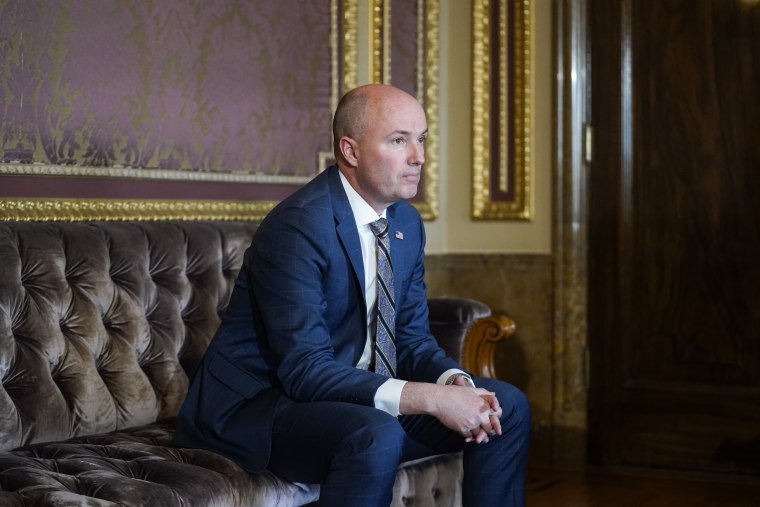Utah Gov. Spencer Cox on Sunday defended a bill he signed last month that bars transgender minors from receiving gender-affirming medical care, saying he wants to see more data on the effects of such treatments.
In an interview on NBC News’ “Meet the Press,” Cox, a Republican, said, “It’s not just about providing care or not providing care; it’s about whether we might potentially be harming young people, not having enough evidence to see what the long-term results of this are and providing better psychiatric help for those young people who are going through this."
Pressed by host Chuck Todd about whether he is comfortable with making the decision for children to seek gender-affirming care away from their parents, Cox said the ban pushes “pause” on accessibility until there is “better data.”
“Well, we take power away from [parents] on a lot of things involving our young people. If there is potential long-term harm for our kids, we need to find that,” Cox said. “And what Utah did was just push pause until we get better data. We have a mandate in the bill to go out and look at the best data all across the country and then make a decision.”
Transgender rights have “become such a toxic issue that it’s hard to have a rational conversation,” Cox said, later adding that "if we could get outside of the culture war piece of this and have these kind of rational conversations, I would feel much better.”
Utah became the first state this year to ban gender-affirming medical care for transgender minors after Cox signed the bill late last month, about a week after it passed in the Legislature.
The legislation, which places an indefinite moratorium on minors' access to puberty blockers and hormone therapy, is prospective, meaning transgender youths who had been diagnosed with gender dysphoria before the date it takes effect will be allowed to receive care if they meet a list of requirements.
In a statement upon signing the bill, Cox said legislation that affects “our most vulnerable youth requires careful consideration and deliberation.”
“While not a perfect bill, we are grateful for Sen. Kennedy’s more nuanced and thoughtful approach to this terribly divisive issue,” Cox said in a statement, referring to the bill’s sponsor, Republican state Sen. Michael Kennedy. “While we understand our words will be of little comfort to those who disagree with us, we sincerely hope that we can treat our transgender families with more love and respect as we work to better understand the science and consequences behind these procedures.”
Last year, Cox vetoed a bill that would have barred transgender students from playing girls’ sports. He cited research about the high risk of suicide among trans youths in an emotional letter explaining his veto.
“I don’t understand what they are going through or why they feel the way they do. But I want them to live,” Cox wrote. “And all the research shows that even a little acceptance and connection can reduce suicidality significantly.”

